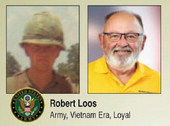a friendship forged under fire


The last time Larry Edwards had been on an airplane before Oct. 3 was when he was returning home from Vietnam in 1969 with his best buddy, Bob Loos. This trip, this flight, was for...


The last time Larry Edwards had been on an airplane before Oct. 3 was when he was returning home from Vietnam in 1969 with his best buddy, Bob Loos. This trip, this flight, was for...